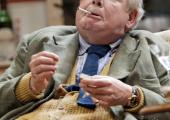Every Good Boy Deserves Favour, National Theatre

Can Stoppard and Previn tell us anything about contemporary Russia?
Over the last 20 years or so, the genre of music we have learnt to associate with the violent assault of a regime upon its adversaries is hard rock blared out on massive speakers at ear-splitting volume, 24/7. First tried out with decisive results by the American military on General "Pineapple Face" Noriega of Panama in 1989, it has been refined in recent times to break down the resistance of innumerable presumed jihadis and insurgents in US detention.


